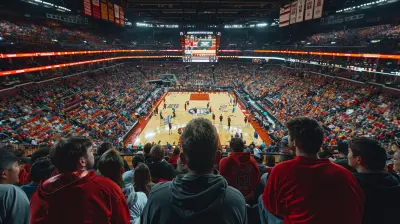The Impact of Travel on Team Performance and How to Manage It
6 January 2025
Traveling is a necessary part of sports, whether it’s for away games, tournaments, or training camps. But have you ever wondered how much travel really affects team performance? It’s not just about jet lag or being away from home. Travel can throw off routines, mess with sleep schedules, and impact both physical and mental well-being. So, how can teams manage the impact of travel and still perform at their best when it matters most? Let’s dig in.

The Hidden Effects of Travel on Team Performance

1. Fatigue and Physical Strain
It’s no surprise that travel is tiring. Whether you’re sitting on a bus for hours, dealing with cramped airplane seats, or navigating through different time zones, travel can wear you out. For athletes, this physical strain goes beyond just feeling tired. Travel fatigue affects energy levels, which directly impacts athletic performance.Think about it: after a long day of travel, the last thing most people want to do is jump straight into a high-intensity game or workout. Yet, that’s exactly what many teams are expected to do. The result? Slower reaction times, reduced endurance, and an increased risk of injury. Not a great combo, right?
2. Mental Fatigue and Focus
It’s not just the body that takes a hit—travel can also mess with your mind. Long hours on the road or in the air can lead to mental exhaustion, especially when players are stuck in uncomfortable environments with nothing stimulating to do. Add in a lack of proper sleep (thanks to time zone changes or bad hotel beds), and you’ve got a recipe for poor focus and mental sharpness.Athletes rely heavily on mental toughness and concentration during games. But when travel leaves them mentally drained, it’s easier for mistakes to happen. Ever notice a team that seems "off" during an away game? Travel-related mental fatigue likely plays a part in that.
3. Disrupted Routines and Preparation
Athletes are creatures of habit. They thrive on routines—whether it’s a specific pre-game meal, a certain warm-up sequence, or a consistent sleep schedule. Travel throws routine out the window. Different time zones, unfamiliar facilities, and unpredictable schedules can all disrupt the regular routines that athletes rely on to perform their best.And let’s not forget about the logistical aspects of travel. Flights get delayed, buses break down, or hotels aren’t up to par. These disruptions can throw off pre-game preparation and create added stress. When athletes are distracted by external factors, they’re not fully focused on the game.
4. Environmental Factors
Travel often means playing in unfamiliar environments. Whether it’s altitude, temperature, or humidity, environmental factors can play a huge role in how athletes perform. A team used to playing at sea level might struggle when competing in high-altitude locations, where oxygen levels are lower, and endurance becomes even more challenging.Additionally, playing in front of an opposing crowd can affect performance. There’s a reason why home-field advantage is such a big deal in sports. The comfort of playing on familiar turf, sleeping in your own bed, and having the crowd on your side can boost confidence and performance. On the flip side, playing in hostile environments can add pressure and throw athletes off their game.

How to Manage the Impact of Travel on Team Performance
Okay, so now that we’ve covered the issues, how do teams manage and minimize the impact of travel on performance? Luckily, there are several strategies that teams can adopt to make travel less of a burden and more of a manageable part of the game.1. Plan Ahead for Optimal Travel Schedules
One of the most effective ways to mitigate travel-related issues is through careful planning. Teams should work with their coaches, trainers, and support staff to create travel schedules that minimize disruption as much as possible. For example, if a team has a game across the country, it makes sense to fly out a day or two early to allow players time to adjust to the new time zone.Additionally, avoiding red-eye flights or long layovers can help reduce the exhaustion that comes with travel. It’s all about finding that balance between getting to the destination on time and ensuring that the team arrives in the best possible condition to perform.
2. Prioritize Rest and Recovery
When on the road, rest and recovery should be a top priority. Athletes need to get plenty of sleep, and teams can help by ensuring that accommodations are comfortable and conducive to proper rest. This might mean booking hotels with high-quality beds or providing players with amenities like blackout curtains and white noise machines to help them sleep better.On top of that, teams should schedule downtime for recovery. After a long trip, athletes should have time to rest, hydrate, and stretch before jumping into intense physical activity. Incorporating light recovery workouts, massages, or yoga can help players get back to feeling 100% before game time.
3. Adapt to Different Environments
If teams know they’re going to be playing in a drastically different environment (altitude, extreme heat, etc.), it’s crucial to take steps to adapt. This might involve arriving at the location a few days early to allow athletes to acclimate. For example, teams playing at high altitudes should plan for extra time to adjust to the lower oxygen levels.In addition to physical adaptation, mental preparation is key. Athletes should be mentally prepped for the unique challenges of the environment they’re playing in. Coaches can help by running through game-day scenarios and helping players visualize how they’ll handle different conditions.
4. Nutrition and Hydration
Travel can throw off an athlete’s diet, especially if they’re eating on the go or relying on airport food. But nutrition plays a huge role in performance, and teams need to ensure that their players are fueling their bodies properly. This means having access to healthy meals both while traveling and once they arrive at their destination.Hydration is also vital, especially when traveling to different climates. Long flights can lead to dehydration, and athletes need to be mindful of drinking enough water before, during, and after travel. Coaches and trainers should emphasize hydration as a priority, especially when playing in hot or humid environments.
5. Mental Preparation and Focus
Since travel can cause mental fatigue, it’s important that teams focus on mental preparation just as much as physical preparation. Players should be taught strategies to stay focused and mentally sharp, even when they’re feeling the effects of travel. This might involve regular mindfulness exercises, meditation, or breathing techniques to reduce stress and keep their heads in the game.Additionally, keeping players engaged during travel can help combat mental fatigue. Coaches can use travel time for team bonding activities, strategy discussions, or film study to keep players mentally stimulated and focused on the game ahead.
6. Utilizing Technology
In today’s world, technology can be a game-changer for managing the impact of travel on team performance. For instance, wearable technology can track players’ sleep patterns, fatigue levels, and overall physical condition. This data can help coaches make informed decisions about when to rest players or adjust training schedules based on how well players are recovering from travel.There are also apps and software that help manage logistics, ensuring that travel plans go smoothly, and players are well-equipped with the information they need to stay organized. From flight schedules to game-day routines, technology can reduce the chaos that often accompanies travel.
7. Team Bonding and Morale
Let’s not forget one of the most underrated aspects of managing travel: team bonding. Travel can be stressful, but it can also bring the team closer together. Long bus rides, airport waits, and hotel downtime provide the perfect opportunity for players to bond, relax, and build camaraderie.Coaches can encourage team-building activities during travel, which can improve morale and help players feel more connected. When a team has strong relationships off the field, they’re more likely to perform better on the field, even when the challenges of travel come into play.

Conclusion
At the end of the day, travel is an unavoidable part of sports. But with the right strategies in place, teams can manage the impact of travel on performance and ensure that they’re ready to compete at their best, no matter where they are. By planning ahead, prioritizing rest, and focusing on both physical and mental preparation, teams can turn travel from a hindrance into just another part of the game.So, the next time your favorite team is on the road, remember that there’s a lot more going on behind the scenes than just getting from point A to point B. But with the right approach, they can rise above the challenges and bring their A-game, no matter the destination.
all images in this post were generated using AI tools
Category:
Team ManagementAuthor:

Everett Davis
Discussion
rate this article
17 comments
Kristy Warner
Travel can significantly influence team dynamics and performance. Prioritizing rest, fostering team cohesion during trips, and effective scheduling are essential strategies to mitigate travel fatigue and maximize on-field success. Balance is key.
April 8, 2025 at 10:53 AM

Everett Davis
Absolutely! Prioritizing rest and team cohesion is crucial for maintaining performance during travel. Effective scheduling can help manage fatigue and enhance overall team dynamics. Balance is indeed essential for success.
Lyla Porter
Great insights! Consider incorporating specific strategies teams have successfully implemented to mitigate travel fatigue, such as tailored travel schedules or recovery protocols. Practical examples would enrich the discussion further!
March 28, 2025 at 9:22 PM

Everett Davis
Thank you for your suggestion! I'll definitely consider including specific strategies and practical examples in future discussions to enhance the article.
Sienna Wilkins
Travel shapes not just logistics but team dynamics; understanding its psychological impact is crucial for optimizing performance and fostering resilience.
February 7, 2025 at 4:07 AM

Everett Davis
Absolutely! Recognizing the psychological effects of travel is essential for enhancing team cohesion and boosting performance. It's key to manage these dynamics effectively.
Jet Rosales
Embracing travel challenges can unite teams, fueling growth and resilience for unforgettable victories ahead!
January 30, 2025 at 5:39 AM

Everett Davis
Absolutely! Facing travel challenges together can strengthen team bonds and build resilience, ultimately enhancing performance and leading to greater achievements.
Selah McTiernan
This article effectively highlights the correlation between travel fatigue and team performance, emphasizing the need for strategic scheduling and recovery practices to mitigate negative impacts and enhance overall competitiveness.
January 25, 2025 at 1:26 PM

Everett Davis
Thank you for your insightful comment! I'm glad you found the correlation between travel fatigue and team performance effectively highlighted. Strategic scheduling and recovery are indeed crucial for enhancing competitiveness.
Josephine McBride
Travel can significantly affect team performance, influencing fatigue, morale, and chemistry. Effective management strategies, such as optimizing travel schedules and incorporating recovery time, are crucial in mitigating these impacts. Prioritizing player well-being can ultimately enhance performance on the field.
January 21, 2025 at 12:36 PM

Everett Davis
Thank you for your insights! Prioritizing player well-being and implementing smart travel strategies are indeed key to maximizing team performance.
Kian McLoughlin
This article insightfully highlights the dual role of travel as both a challenge and an opportunity for team cohesion. Effective management strategies, such as optimizing schedules and fostering mental resilience, are crucial for mitigating fatigue and enhancing overall performance during away games.
January 16, 2025 at 9:21 PM

Everett Davis
Thank you for your thoughtful comment! I'm glad you found the discussion on managing travel challenges and opportunities for team cohesion insightful.
Parker McClain
This article provides valuable insights into the often-overlooked effects of travel on team performance. Understanding and managing these factors can significantly enhance outcomes. Thank you for shedding light on such an important aspect of sports management!
January 12, 2025 at 12:43 PM

Everett Davis
Thank you for your thoughtful feedback! I'm glad you found the insights valuable for sports management.
Sage Palmer
Travel fatigue can undermine performance; strategic planning and recovery are crucial for optimizing team success.
January 11, 2025 at 8:41 PM

Everett Davis
Absolutely! Effective planning and recovery strategies are essential to mitigate travel fatigue and ensure optimal team performance. Thank you for highlighting this important aspect!
Andrea Clayton
This article thoughtfully highlights the challenges travel poses to team performance, stressing the need for effective management strategies. While travel can disrupt routines and fatigue players, proactive planning and recovery practices can mitigate these effects, ultimately enhancing both team cohesion and performance on the field.
January 10, 2025 at 11:30 AM

Everett Davis
Thank you for your thoughtful insights! I'm glad the article resonated with you and emphasizes the importance of proactive management in addressing travel-related challenges.
Harvey Sawyer
This article astutely highlights the often-overlooked correlation between travel fatigue and team performance. By implementing strategic scheduling and recovery protocols, teams can mitigate travel's adverse effects, ultimately enhancing competitiveness and player well-being throughout the season.
January 10, 2025 at 5:31 AM

Everett Davis
Thank you for your insightful comment! I’m glad you found the correlation between travel fatigue and team performance important. Strategic scheduling and recovery are indeed crucial for maintaining competitiveness and player well-being.
Daria Hardy
Travel challenges teams, but overcoming them fosters unity, resilience, and ultimately enhances performance on and off the field!
January 9, 2025 at 4:50 AM

Everett Davis
Absolutely! Travel indeed presents unique challenges that can strengthen team bonds and improve overall performance through shared experiences and resilience.
Farrah Bowman
This article highlights a crucial aspect of sports that often goes overlooked. Proper travel management can significantly influence team dynamics and performance, making it vital for coaches and organizations to prioritize.
January 8, 2025 at 8:03 PM

Everett Davis
Thank you for your insightful comment! I completely agree that effective travel management is essential for enhancing team dynamics and performance. It’s often underestimated but plays a critical role in overall success.
Olivia Dillon
Great read! It’s fascinating how travel can shape a team's performance, both positively and negatively. The tips for managing fatigue and maintaining focus are super helpful. As a fan, I appreciate how much effort goes into keeping teams at their best on the road!
January 8, 2025 at 12:41 PM

Everett Davis
Thank you for your feedback! I'm glad you found the tips useful and appreciate the insights on travel's impact. Safe travels to you too!
Mason McNeil
Travel can significantly influence team dynamics and performance. Strategic planning and mental preparation are essential to mitigate fatigue and enhance focus during competitions.
January 7, 2025 at 11:34 AM

Everett Davis
Thank you for your insight! I completely agree—effective planning and mental readiness are crucial for optimizing team performance during travel.
Joel Wood
Travel fatigue affects performance; smart management can mitigate risks.
January 7, 2025 at 5:24 AM

Everett Davis
Absolutely! Effective management strategies, like scheduled breaks and flexible work hours, can significantly alleviate travel fatigue and enhance team performance.
Zephyra McAlister
Travel undeniably shapes a team's dynamics, influencing performance both positively and negatively. Effective management, including strategic scheduling and wellness initiatives, can mitigate fatigue and enhance cohesion, ultimately turning the challenges of travel into opportunities for growth and resilience.
January 6, 2025 at 3:39 AM

Everett Davis
Thank you for your insightful comment! I agree that effective management can transform travel challenges into valuable growth opportunities for teams.
MORE POSTS

How Fighters Recover Between Rounds: Secrets of the Cage

Why Womens College Sports Deserve More Attention

The Best Strength Training Exercises for Building a Strong Back

The Role of Influencers in Modern Fan Engagement

Fitness Challenges to Keep You Motivated and Accountable

Free Agency Frenzy: Whos On the Move?

What Makes a Successful College Sports Program?

The Role of Breathing Techniques in Maximizing Strength

Sports Films That Focus on Mental Toughness and Resilience

The Battle of Midfield: Controlling the Game with Precision

Previewing the Offensive Onslaught: Who Has the Edge?